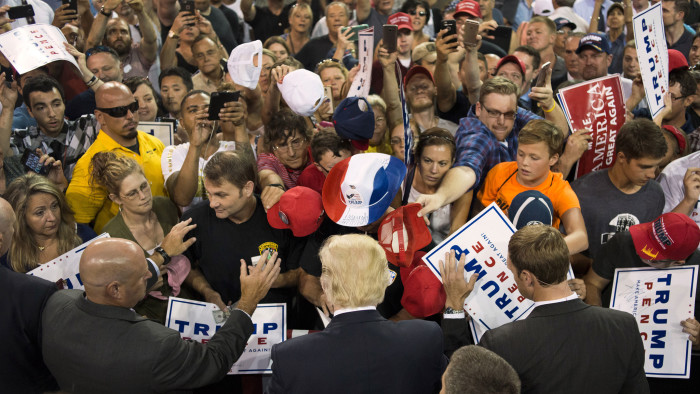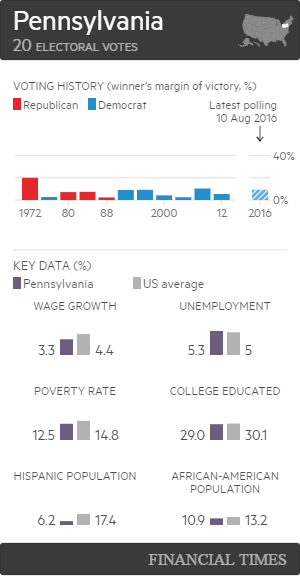Trump loses his shine in Pennsylvania

Roula Khalaf, Editor of the FT, selects her favourite stories in this weekly newsletter.
Just last month, Pennsylvania appeared to be ground zero on an electoral map that was changing in Donald Trump’s favour.
Home to a large population of white, blue-collar workers, many employed in the coal and steel industries, the state was primed for Mr Trump’s antitrade and anti-immigration message, with many Democrats feeling left behind by their own party. A sizeable population of swing voters meant that Mr Trump also had a chance to win Pennsylvania’s moderates.
In early July, a Quinnipiac University poll gave Mr Trump a two-point lead over Hillary Clinton in the state, forecasting that he would be the first Republican to take Pennsylvania since George H W Bush won the state in 1988.
But last week, Quinnipiac released a new survey with a vastly different prediction: were the election held tomorrow, Mrs Clinton would win Pennsylvania by eight points. A RealClearPolitics average of polls gives her a nine-point lead.
How Mr Trump appears to have lost Pennsylvania, a Rust Belt state that is fertile ground for his message and which he won overwhelmingly in the Republican primary, speaks to the toll his recent controversies have had on his poll standing, not just nationally but in battleground states.
“I’m not prepared to say there can’t be a comeback,” said Terry Madonna, director of Pennsylvania’s Franklin & Marshall College poll. “But he’s running out of time and he’s running out of states that he should be doing better in that he’s not.” These include Virginia and Wisconsin.
In Pennsylvania, Mr Trump’s greatest vulnerability is the Philadelphia suburbs, an area where an estimated 1m votes will be cast, many by moderate Republicans and working-class whites.
While Mr Trump had once been expected to hold his own among those groups, the slew of negative headlines over the past few weeks appears to have damaged his prospects, especially among college-educated whites and women, said Christopher Borick, director of Pennsylvania’s Muhlenberg College Institute of Public Opinion.
Speaking in central Pennsylvania on Friday night, Mr Trump insisted that he would still win the state that was home to Wharton, his business school alma mater, and that a Clinton win would be the result of mass voting fraud in cities such as Philadelphia and Pittsburgh.
“The only way we can lose Pennsylvania — I really mean this — is if cheating goes on,” Mr Trump told the riled-up crowd in Altoona. “We have to call up law enforcement and we have to have the sheriffs and the police chiefs and everybody watching,” he warned.

Mr Trump is still expected to win much of the so-called ‘T’ of Pennsylvania, the central, T-shaped swath of the state that is largely rural and traditionally votes Republican. Supporters leaving his rally on Friday night said that they remained as committed to him as ever, even if they disagreed with some of his recent comments, such as his attack on a Muslim-American military family.
Outside the arena, however, there were signs that Mr Trump’s support was flagging even among these voters.
Maryanne Gardini, a middle-aged line cook in Republican-leaning Blair County, said that while her sister remained a fervent Trump supporter, she was growing more disgusted with him.
“I don’t like Trump. I don’t like his attitude. I don’t like the way he talks to women,” she said. “I don’t want him to push the button.”
Steve Bolsak, a 68-year-old retired mailman in Hollidaysburg, said: “I just consider him a bigot and a racist and I’m not that kind of person. I could live with John Kasich, Jeb Bush. But this guy, I think he’s a little deranged.”
A lot of disgruntled blue-collar Democrats in the state appeared to be up for grabs, but these voters are also being turned off by Mr Trump, said Lara Brown, a political-science professor at George Washington University. “If Trump could have moderated and grown he might have been able to pick them up, but now at this point I think he looks too risky.”
“At the end of the day what’s happened is most people — even blue collar people — are saying ‘he’s just too reckless’,” she added.
On Monday, Mrs Clinton will appear with vice-president Joe Biden in Scranton, Pennsylvania, an appearance that was originally scheduled for early July but was delayed after the shooting of five police officers in Dallas.
While the event had initially had been intended to shore up Mrs Clinton’s support in Pennsylvania, it is now expected to have the feeling of a victory lap with both the candidate and Mr Biden emphasising their blue-collar Pennsylvania roots. (Mrs Clinton’s father and grandfather, a factory worker, hailed from Scranton, and the candidate spent many of her childhood summers there, while Mr Biden was born in the city.)
To win over more white, working-class Pennsylvanians, the campaign’s message is simple, said Gillian Kratzer, the Democratic chair of Blair County, Pennsylvania.
“What we are saying is Donald Trump is an out-of-touch billionaire,” she said. “There is no way he can relate to the day-to-day life of [average] Pennsylvanians.”
Comments